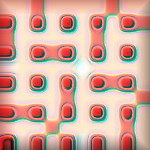Brainsteem #7 Prize Maths Puzzle [Win 2SBD+1SBD]

The Question
Suppose n is a product of four distinct primes a, b, c, d such that
(i) a(a + b + c + d) = c(d - b);
(ii) 1 + bc + d = bd;
(iii) a + c = d.
Determine n.
The Prizes
Earnings from each Brainsteem Puzzle will go towards the next Prizes.
For this Brainsteem # 7 the Prizes are:
2 SBD for the first correct answer that includes a valid method
1 SBD for one other correct answer that will be chosen randomly. That means you can still win this prize even if the answer may already be visible!
Please upvote! Resteem if you think this is a great puzzle! I will upvote all correct answers and any other interesting comments. To be fair to everyone, the prize closes after 7 days. Winners will be notified after that date and usernames posted with a solution.
Enjoy!
From the final equation a + c = d, we know that either a or c must be 2 to make both sides odd.
Consider 1 + bc + d = bd, if c = 2, then left hand side is even but right is odd, therefore a=2.
Now we have 2+c=d from the final equation. --- equation(1)
Substitute this into 1 + bc + d = bd, we have 3+c = 2b. ---equation (2)
Sub (1) and (2) into a(a + b + c + d) = c(d - b), we have a quadratic equation in c, solving will give c=-2 (rejected) or c = 11.
Now we have (a,b,c,d)=(2,7,11,13)
Btw this is really a nice question! Really fun :)
Well done! You won first prize. 2 SBD sent to your account.
It's A = 2, B = 7, C = 11, and D = 13
I tried trial and error method. Where I randomly choose prime numbers.
But given the equations, should use the smallest prime numbers as possible.
So its gonna be :
2 (2+7+11+13) = 11(13-7) > 66 = 66
1 + 7(11) + 13 = 13 (7) > 91 = 91
2 + 11 = 13 > 13 = 13
All the equations are equal, which means the values are the solution. This is not a recommended method but is useful if you haven't have a choice.
Well done! You won the random 2nd prize. 1 SBD sent to your account.
I don't understand but Thanks you LOL! Follow me back!
Just to clarify, you want the answer in the comments?
Yes, that's the reason for the 2nd random prize - not to freeze the problem just because of one correct answer!
And method, please. Thanks
Alright so I didn't do this with a mathematical approach but rather a software engineering approach. First thing I did was created a list of the first 1000 prime numbers and threw them into a predefined array (list)
Since I had the array and I had then created a few rules that must be true. First of all, a = d - c and the reason I have it as that is a rearranged the d= a + c and I did that because I could rearrange another formula to get D by itself without the use of A. I then rearranged the 1+bc+d=bd to get bd-d = 1+bc which can be rearranged to d(b-1)=1+bc and finally becomes d=(1+bc)/(b-1)
By this point I am now only relying on 2 variables, B and C... while I could potentially solve with system of equations I instead decide to do some brute forcing with a computer but for that I need an equation to brute force. So I take the first equation a(a+b+c+d)=c(d-b) and I rearrange it to a(a+b+c+d)-c(d-b)=0 and proceeded to brute force. Now the brute force worked by setting B to equal a prime number in the list then set c to equal the first prime and cycle through every single prime number and print each set of B and C that made the equation that is equal to 0 return true. Then those numbers were sent to a second layer to determine that both A and D were prime numbers. If they were it would then print out the product of the 4 numbers.
This output a single answer of 2002 where A=2, B=7, C=11, D=13
I know this probably isn't the method you had hoped for but its how I think.
If you want me source code I will give it to you, anyways I apologize that I corrupted your math challenge with programming.